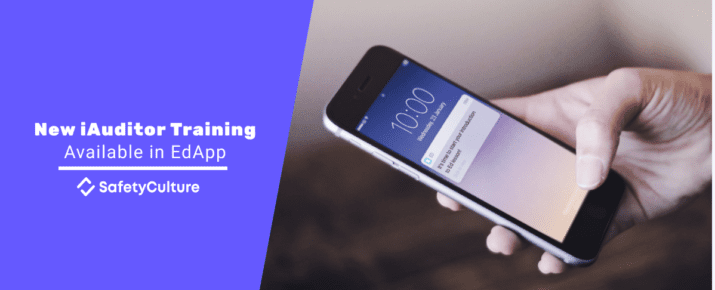How to empower your team with full visibility
iAuditor by SafetyCulture Tips | Tips & Tricks | By | 22 Jul 2020 | 3 minute read

It’s time to ask the difficult questions
Are your frontline employees reporting every issue that occurs?
If a critical health and safety issue occurs today, will your team be ready to respond effectively?
Now is the time to make sure that your business can answer these vital questions. COVID-19 has changed the way that organizations around the world operate. Everywhere is now high-risk, and effective issue management has quickly become a prerequisite for success.
Why issue management failures can be an early warning sign
Recurring issues can provide an early signal that broader safety problems are plaguing your organization. Frontline workers will only continue to highlight issues when they feel that their reports will be investigated and resolved. If workers don’t understand the process for reporting issues or have concerns about negative repercussions, they won’t report. Similarly, employees who take active steps to report incidents can quickly become disillusioned with the process, unless a visible change occurs.
Issues that repeatedly occur without resolution provide a clear indication to employees that safety is not a priority for leadership within their workplace. A compelling operational reason exists for repeated failures, or a cultural problem is affecting employee engagement within the issue response process.
Developing a safety culture requires organizations to deliver the right tools to enable workers to take ownership of issues and observations. Frontline staff must be able to easily report issues, track progress, and view resolution data. An inclusive process that breaks down internal silos and provides end-to-end visibility for everyone is essential.
How disengaged workers were slowing issue response
BOS Solutions were struggling with delays in issue response times at their many remote locations. The team lacked the workflow necessary to investigate issues, resolve failures, and take corrective action to prevent future occurrences.
Careful case management is essential for the timely resolution of issues in the oil and gas industry. However, employees at BOS Solutions had stopped reporting observations because they lacked sufficient visibility of the issue workflow. Frontline workers had minimal insight into how their reports would drive change or make their workplace safer. This lack of visibility resulted in workers losing faith and abandoning the process entirely.
Why frontline issue reporting is more critical than ever
In the post COVID-19 world, increased regulation has changed how businesses operate, and new compliance challenges continue to appear each day. A single positive worker could force your business to shut down or modify operations to prevent a cluster emerging. Fast access to accurate operational data is now more important than ever before. Protecting team members, products, and processes from external threats requires a new approach that can deliver higher visibility levels using your employees at the coal face.
Empowering employees with the tools to capture and report issues can help leaders respond to new challenges faster. Frontline team members have their ear to the ground, and they can provide issue data that isn’t available elsewhere. Leveraging the best incident management software enhances this process, allowing for more efficient identification of trends and quicker resolution of incidents with fewer recurrences.
Poor employee engagement is reducing operational visibility
Many organizations have an ineffective issue management system that fails to adequately engage with employees. Frontline workers may follow the correct process by raising an issue report and never hear anything ever again. The unidirectional flow of information results in workers quickly developing a perception that their efforts are futile.
The cumbersome and overcomplicated design of many issue reporting systems is also impacting adoption levels. Reporting issues and incidents shouldn’t be a burden for employees in the field. Rather, reporting must be a simple, organic, and routine daily occurrence that encourages the flow of information, empowering the entire team.
Developing a safety culture starts with empowering frontline workers
One of BOS Solutions’ team members recognized the impact that an information disconnect was having on frontline worker engagement and initiated the change process.
BOS Solutions turned to iAuditor to address their issue management workflow. Digital reports have delivered enhanced visibility for the entire team. Every employee can now quickly share incident data including photos instantly with their mobile device. iAuditor has allowed BOS to empower frontline workers by engaging them with the process from start to finish. The new issue management process has helped the team to develop a culture of safety and accountability, resulting in faster response times.
Empower your team today with iAuditor
Start building your safety culture today by empowering frontline employees with the tools they need to capture issues in the field. Select the right tools to make safety an organic part of each day for your team members. Leverage new data insights to help leaders make decisions faster with all of the information.
BOS Solutions uses iAuditor’s issues features to empower every worker. Learn more about managing issues and observations in iAuditor.
Important Notice
The information contained in this article is general in nature and you should consider whether the information is appropriate to your specific needs. Legal and other matters referred to in this article are based on our interpretation of laws existing at the time and should not be relied on in place of professional advice. We are not responsible for the content of any site owned by a third party that may be linked to this article. SafetyCulture disclaims all liability (except for any liability which by law cannot be excluded) for any error, inaccuracy, or omission from the information contained in this article, any site linked to this article, and any loss or damage suffered by any person directly or indirectly through relying on this information.





